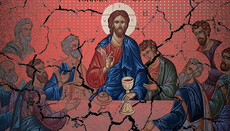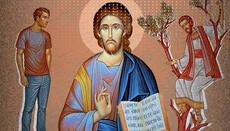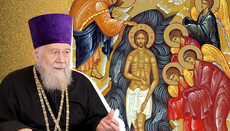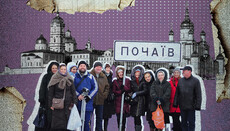The plague of the twentieth century
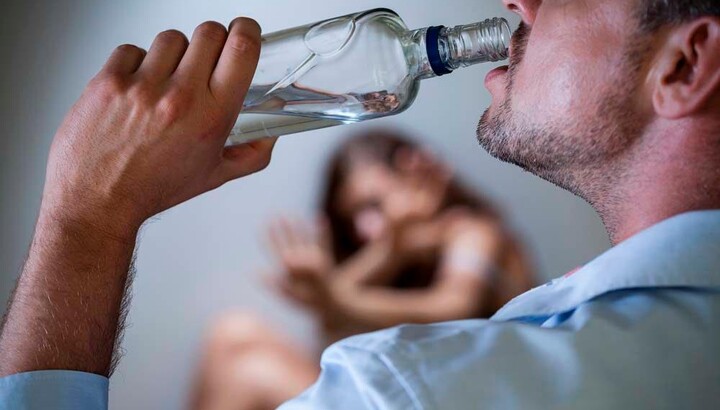
A demon tempted a monk, offering him a choice: to fall into fornication, to kill a person, or to drink wine. The monk thought: it is better to drink wine. He drank, then fell into fornication and killed a man.
“Do not be deceived: neither the sexually immoral, … nor drunkards... will inherit the kingdom of God.” (1 Corinthians 6:9)
On one Kyiv street, there’s a bar with the romantic name “Paluba” ("The Deck"). And indeed, it does look like a deck – raised about two meters off the ground, with steps like a gangway, rectangular in shape, with tables, and walls painted with scenes of azure seas, white yachts, and soaring seagulls. It’s a place where the locals gather. Besides alcohol, you can get coffee or tea, play chess or backgammon, do crosswords, and have small talk.
And I, I must admit, would sometimes wander in – just to kill time – and before I knew it, I had unintentionally struck up acquaintance with a few regulars from our urban outskirts. I wondered what connects these people, why they keep coming here so regularly and why they leave their families behind to spend time here.
Interestingly, the visitors are not foolish and quite diverse: simple and complex, cheerful and gloomy, with higher education or without it. Naturally, I realized that alcohol is what brings most of them together. Here, they feel free and uninhibited, unaffected by their life circumstances and personal troubles. They understand one another without words. The usually talk about football or politics, often ending in arguments – and sometimes even in fights, especially when someone’s too drunk to make sense.
One guy, in a drunken frenzy, started throwing money around and harassing Liuba, the bartender, until she called the police… A sad scene.
There was a guy nicknamed Marcello. His real name was Vitaly Marchenko, and the nickname came from his last name. He was truly handsome, looking like the Italian movie star Marcello Mastroianni. Anyway, he made good money, treating just about anyone to cognac and vodka, and smoking expensive cigarettes. He worked as a taxi driver for many years and knew how to earn well. He would spend hours waiting in his Peugeot near the local train station and somehow always managed to pick up wealthy passengers who didn’t mind spending money. He also worked for a gypsy baron named Mikhail who lived in Krasny Khutor. The baron was always in touch with Marcello and could call him anytime to come to a restaurant on the other side of town or pick him up from the casino, where the baron somehow always hit the jackpot.
So, one fine day Marcello quit — for good. He even stopped smoking. After greeting me in the church where he came with his wife, he invited me for coffee. He wanted his wife Lida to talk with me and learn some things about church practice. The café was near our cathedral, and I asked him to wait there while I changed out of my vestments after the service, covered the altar, and locked the liturgical vessels – the chalice, paten, and other items – in the safe.
We were having coffee with some pastries and chatting. Lida wanted to know which of our priests was best for confession, how to fast before communion, and if you needed to confess your sins in detail. I told her details aren’t necessary – what matters is to acknowledge the sin, repent, and do your best not to repeat it.
Then Marcello surprised me with his story.
– Have you heard? Lekha died.
– Which Lekha?
– Alaverdov.
– No way! He wasn’t even forty yet!
– Yeah. Skilled guy. He did a high-end renovation in my apartment, just amazing. Customers were hunting for him. He could earn up to 100,000 hryvnias a month from one job for rich people. But he drank heavily, got blackout drunk…
– Yes, I remember, I replied sadly. After all, Lesha did some small repairs for me too. He believed in God, although he didn’t go to church. He often quoted the Psalms and the Gospel, frequently repeating: "God opposes the proud but gives grace to the humble" (James 4:6). He wasn’t proud. But he struggled with alcoholism. When he was drinking, he could spend the night on a bench. After spending all his money, he would pawn his tools and phone. In other words, he hit rock bottom, as he put it. Then he would pull himself together, his mother would take him to the hospital to get IV therapy to detoxify his blood, and he’d come back sober and grim, returning to work. He’d reclaim his tools from the pawnshop and start earning well again, sometimes going months without drinking. Until he relapsed into drinking...
– Ah, what a pity, I said, crossing myself. May the Lord forgive him. It’s really sad.
And Marcello began naming all the familiar guys who used to visit “Paluba” and who had died from alcohol-related causes over the past two years. He counted more than ten people. Some of them lived in neighboring houses. Almost all of them were residents of the same neighborhood. The guys were mostly sensible, straightforward, reliable, kind, and nature- and animal-loving. Witty, cheerful, humorous. I once heard from a psychologist who said that, as a rule, alcoholics are gifted, charismatic people but unhappy. Usually, they lose their life force in this harsh world. Without internal protection or willpower, they start doping themselves with alcohol. At first, in small doses, then gradually increasing them, until they become alcoholics. Many manage to balance their whole lives like this, somehow drinking, working, and supporting their families. However, this usually comes at a high cost to the family.
– Take Valerka the Jeweler, for example, Marcello continued, I remember him well – always neatly dressed, wearing an elegant gold ring on his finger, smoking expensive Camels, and doing crossword puzzles. A couple of years later, he showed up at the café without his ring and with trembling hands. He wasn’t doing jewelry work anymore; he’d been fired for drinking. He stayed home taking care of his sick father, his wife had left him earlier. The last time I saw him, he asked to borrow some money. He pointed to his legs, dark blue with varicose veins, lifting the cuffs of his pants. “I don’t feel them,” he said in a detached tone… About a month later, I was told that the Jeweler had died.
These sad stories could go on, but I’ll leave them out.
As our meeting with Marcello and his wife came to a close, a few parables came to mind:
“A demon sits on a fence, swinging his legs. Another demon asks him why he left his longtime subject, whom he’d been tempting for years. The first demon replies, ‘He drinks black – why tempt him? He’s already in hell.’ You know, one man admitted he was tormented by alcohol addiction, saying, ‘I don’t know what to do! I can’t drink anymore, but I can’t stop either. It’s some kind of hell...’”
Another famous parable tells of a monk tempted by a demon who offered him a choice: to fall into lust, kill a man, or get drunk. The monk thought, ‘Better to drink some wine.’ He got drunk, fell into lust, and killed a man. No wonder some addiction specialists call alcoholism ‘the plague of the 20th century.’ And they’re right.
Later, I had the chance to read some literature on alcoholism. I learned that Ukraine, like Russia, ranks among the top countries worldwide in terms of alcohol-related illnesses and deaths.
Orthodox believers know that many people touched by this problem, directly or indirectly, have been freed from this passion forever thanks to the Church and its prayers. But that’s a story for another time.
